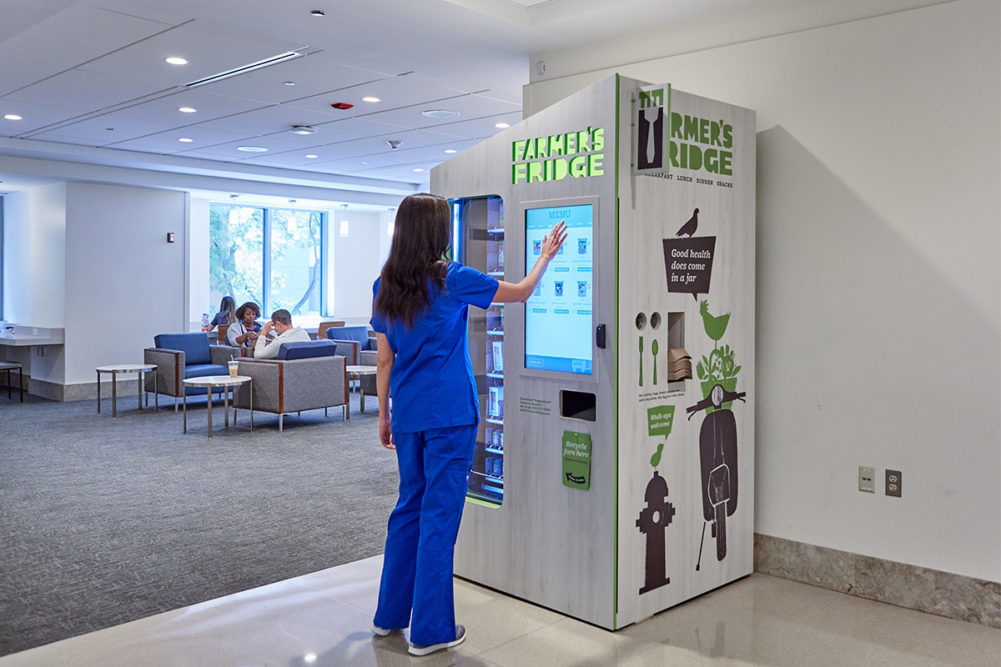CHICAGO — It has been a decade since Farmer’s Fridge stocked its first automated smart fridge in downtown Chicago. Today, more than 600 fridges across the country dispense the company’s chef-curated meals and snacks that are sold in clear, recyclable and reusable plastic jars. Farmer’s Fridge is the brainchild of Luke Saunders, chief executive officer, who quit his traveling sales job in pursuit of figuring out how “fresh food could be as accessible as a candy bar?”
During the past 10 years, Mr. Saunders has made a lot of pivots, especially during the pandemic, as almost all the early refrigerator placements were in locations that closed, namely airports, office buildings and schools. One of the first pivots was into hospitals and first responders’ facilities. Home delivery was next, and, about at the same time, the company partnered with retailers for a grab-and-go shelf presence. Today Farmer’s Fridge is bridging the gap between fresh food and convenience by having distribution in such retailers as Target, Amazon Go, Walgreens, 7-Eleven and Jewel-Osco, as well as through Getir delivery.
Recently the company stopped its home delivery business because “we had more volume we were moving through retail and fridges than we could handle,” Mr. Saunders said. “It was a strategic decision so that we could scale up our retail distribution in the markets where we have fridges and consumers know our products.”
While copycats have emerged over the past decade, Mr. Saunders takes that as a compliment.
 Luke Saunders, CEO of Farmer's Fridge.
Luke Saunders, CEO of Farmer's Fridge.
Source: Farmer's Fridge
“Together we are solving a problem,” he said. “I did it first, and I know how hard it is to do. It’s the execution that makes it really, really hard.”
Here’s how the business works. Meals and snacks are manually packed by a 150-person team working on a conveyor line in a 37-degree room on Chicago’s South Side. While the facility is near Midway Airport, the perishable foods are not delivered by plane to locations in Los Angeles, Houston and Boston. Rather, at about 6:00 every morning, some of the company’s 75 full-time drivers start picking up boxed jars and loading them onto trucks for their trek across the country.
The technology fueling Farmer’s Fridge that functions as a business advantage and safety measure is a predictive algorithm that tracks inventory and individual fridge sales patterns, ensuring each location is stocked to optimize demand and reduce waste.
“The cold chain is monitored end-to-end to ensure peak product freshness,” Mr. Saunders said. “Our proprietary software helps reduce food waste, forecast ingredient needs and accurately schedule restocks.”
In 2022, Farmer’s Fridge was granted its first utility patent for inventory management for, “systems and methods for intelligent inventory management across a network of vending machines.” This, and other technologies developed in-house, enables the company to remotely lock an entire fridge, in the case of an overnight power outage, for example. Or, if there’s a recall on a specific ingredient, the company can just shut down the selling of those specific items in a machine.
“We have the ability to do a remote recall,” Mr. Saunders said. “This came in very handy during the romaine lettuce recall. It’s better to be safe than sorry.”
The company intentionally keeps its menu at about 25 items to have better control over quality and costs. The menu along with the inventory software, has reduced annual waste to the low single digits, Ms. Saunders said.
“Our goal is for zero waste,” he said. “This will be possible through composting and donations.”
Over the past few years, Farmer’s Fridge has donated more than 400,000 meals to support community members in need along with frontline workers throughout the pandemic. Currently the company is partnering with Feeding America to help provide 1.5 million meals to people experiencing food insecurity.





